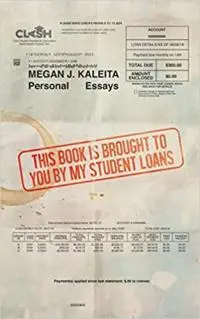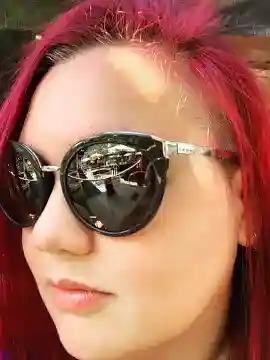Original photo via Andrea Piacquadio
I spent the years after graduation in awful office jobs with none of my novels finished and a pile of unpublished short stories. I would troll through Duotrope on my lunch break and try to find journals and lit magazines to submit to after each fresh rejection. Eventually, the only validation I got as a writer would be when someone from the management team who made at least 20k more than me a year would stop by my desk and say, “Hey, that memo you drafted was really great.” Unfortunately, I let this trick me into believing a colossal lie: it doesn’t matter what I write; I just want to get paid to write. Now that I'm on the other side of that sticky untruth, I can tell you it very much matters what you write. I was writing full-time and the words were paying the bills. And it was killing my voice as a writer.
Young me made the somewhat wobbly jump to freelance copywriting and was knee-deep in commerce culture jargon for five years. Upon finding out what I did for a living, many other writers were impressed, jealous even. “I wish I could get paid to write all day.” But I wasn’t writing; I created content. Being a content copywriter is to writing what shitty TikTok dances are to ballet. It is the adult coloring book of writing. Having confused paying the bills for validation, I believed if I unfeelingly churned out enough Black Friday ads for snow tires, the writing Gods would come down and grace me with a finished manuscript, an agent, and a bidding war. Instead, after years of writing successful sales campaigns, blogs, podcast scripts, product listings, and worrying about Google rankings, I had less than four legally usable professional portfolio pieces and a bunch of unfinished novels. I was making money writing so I told myself it was asking for too much to be writing something that mattered. Asking who, I don’t know. The Universe? Skeletor? This idea took pretty deep root over time and when I did write my own material it came out stilted and off-kilter; like I was trying to apologize as I wrote. So I stopped.
 I didn’t realize that trying to find new ways of saying, “Hey, you should buy this thing you probably don’t need,” had washed my mind blank of anything that resembled my own voice. In a weird series of events, my book, This Book Is Brought to You By My Student Loans, came out with Clash Books just as I reached my stride as a marketable freelancer. I wrote all day long, and what I was writing was inauthentic, stagnant, and most of all, felt intensely phony. As I reread my book, I realize now how deeply writing for mass-market commerce impacted my tone. My book was more apologetic than I wanted it to be; I held back where I shouldn’t have and whined where I should have taken accountability. I pulled punches because I had begun to think as a marketer, not as a writer. I was writing for #girlboss markets, feel-good markets that bordered on Girl, Wash Your Face territory, markets that thrive on inauthenticity, and use the words "business bestie” unironically and without feeling nauseous. This was not the audience who would appreciate the essay I wrote about shitting myself. Girl Bosses don’t fart, let alone shit their pants.
I didn’t realize that trying to find new ways of saying, “Hey, you should buy this thing you probably don’t need,” had washed my mind blank of anything that resembled my own voice. In a weird series of events, my book, This Book Is Brought to You By My Student Loans, came out with Clash Books just as I reached my stride as a marketable freelancer. I wrote all day long, and what I was writing was inauthentic, stagnant, and most of all, felt intensely phony. As I reread my book, I realize now how deeply writing for mass-market commerce impacted my tone. My book was more apologetic than I wanted it to be; I held back where I shouldn’t have and whined where I should have taken accountability. I pulled punches because I had begun to think as a marketer, not as a writer. I was writing for #girlboss markets, feel-good markets that bordered on Girl, Wash Your Face territory, markets that thrive on inauthenticity, and use the words "business bestie” unironically and without feeling nauseous. This was not the audience who would appreciate the essay I wrote about shitting myself. Girl Bosses don’t fart, let alone shit their pants.
When I think about the core of my tone and voice as a writer, I think of myself at thirteen, a period where I realized making art and telling stories had to be part of who I was. Besides gorging on pulp crime novels and feminist poetry, that time mainly consisted of using rubber ink stamps and “India ink” from Claire’s to give myself fake neck tattoos. This was when the root of my voice and creative identity was formed, and losing it mattered to me in a way I may never find words for.
The time I spent “tone matching” corporate marketing copy recalibrated my view of how we communicate our needs and tell our stories, and I looked at everything through a financial lens. Writing for SEO and targeted audiences, using psychological writing methods to sell something with no actual value, had scrubbed the faux India ink tattoos off my soul and left me with a vocabulary that rivaled a Carebear with a head injury. I had to dig through the rubble of my skills to find ways to make someone think that the next time they spent money would be the first day of the rest of their life. Writing like this made me afraid that my voice, that the stories only I could tell, the truths I knew, and how I told them would cost other people sales, and costing them sales would cost them money. And if I cost them money, they couldn't pay me money. If they couldn't pay me money, I wasn't a real writer. It was easy to hide in content creation because I thought there wasn’t any rejection there — at least not in a way that I understood it as an author.
There was rejection, though; people who want to sell things tend to think you’re for sale, too. This was my first foray into the capitalistic squeeze writers, musicians, and artists feel when they realize how easy commodification is in a field that needs their skill but gaslights them into thinking this is as far as their success can go. The idea of “just writing for a living” didn’t come with a guidebook on protecting my work professionally. You’re not “just writing” when you freelance. You’re also an accountant, a secretary, a content manager, a social media manager, a customer service representative, and a lawyer. You become the product over time, and I didn’t know how to handle that or protect my work. If you saw Black Friday ads for certain big box stores in the fall of 2017 and 2018, the Non-Disclosure Agreement I signed won’t let me tell you I probably wrote some of them. I was so desperate to take jobs that I didn’t understand how to boost my hiring potential. Nondisclosure Agreements, ECommerce paywalls, and content creation clauses meant I didn't get digital portfolio rights to my work. I can’t compete for high-paying writing gigs by presenting recognizable campaigns to potential employers unless I want to be sued for breach of contract. Many companies that use freelancers use this tactic to keep you exclusive to them without hiring you as an employee. Fuck yeah, capitalism.
When my book came out I knew how to market shit with my eyes closed. Exhaustion and fear made me hide. I spent every day selling something for someone else, but the idea of selling myself for myself, letting myself have my voice back, felt like I was cheating on a lover. Without realizing it, I had gotten a toxic positivity marketing contact-high. I stand by the book I wrote. I love that book and the publishers who helped me write it. But I was afraid of it. I was scared of the woman who wrote it, how little she cared about the B2B sales funnels and SEO targeted big box ads that paid her bills.
The Kool-Aid started to wear off during the pandemic as I spent days drafting emails about how this product that has nothing to do with the unspoken loss and fear you may be feeling can fix your impending sense of dread for twelve easy payments of $29.95.
I still freelance because I still have bills to pay. I now have a much better sense of how to protect myself, get paid, and enforce contracts. I sometimes miss the small, crooked blessing of a cubicle farm job, where I could lose myself all day in a plot point, or look busy for three hours with a Google Doc open in front of me, honing the paragraph that suddenly changes everyone’s perspective of my main character and makes them hate her a little more than they’re rooting for her. People hardly ever noticed, and I still had a steady paycheck.
Since I parted ways with my last long-standing client, I’ve almost finished one of the novels I had abandoned for corporate email sequences. I wrote and pitched seven comedy articles in a week, and three got accepted. I don’t write like I’m apologizing anymore. I don’t have to use words like “automagically” or “badass business babe.” If you need to make some extra money, freelancing is an option. If you want to be a copywriter, I guess go for it if the goal of your life’s work is to make a broke Christian housewife think she can make 10k a month if she attends a webinar. It’s your call; it’s your voice. I thought I’d find artistic validation in writing blog posts for people who based their entire lives on their Myers-Briggs Type. I cannot stress enough how much you won’t find validation there. There is no artistic integrity in being someone else’s Sancho Panza.
Get This Book Is Brought To You By My Student Loans at Bookshop or Amazon

About the author
Megan won a sci-fi short story contest when she was 15 and got real smug about it. It’s been 20 years and she’s still smug about it. A native Upstate New Yorker, Megan is also a professional nomad and has lived in and worked in many different states on both coasts. She is adamantly against having an address she can remember for more than two years. She currently lives in Boise, but we’ll see about that. Her collection of essays, This Book Brought To You By My Student Loans is out with Clash Books. You can find her fiction in Luna Station Quarterly and Hello Horror, and her comedy nonfiction in Ravishly, Daily Drunk Mag, and Spoonie Magazine.








